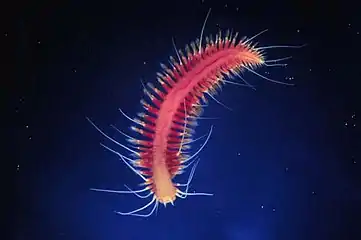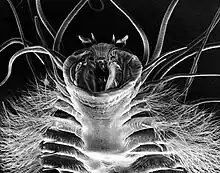| Sirsoe methanicola | |
|---|---|
 | |
| S. methanicola | |
 | |
| Close up of the head of S. methanicola | |
| Scientific classification | |
| Domain: | Eukaryota |
| Kingdom: | Animalia |
| Phylum: | Annelida |
| Clade: | Pleistoannelida |
| Subclass: | Errantia |
| Order: | Phyllodocida |
| Family: | Hesionidae |
| Genus: | Sirsoe |
| Species: | S. methanicola |
| Binomial name | |
| Sirsoe methanicola Desbruyères & Toulmond, 1998 | |
| Synonyms[1] | |
| |
Sirsoe methanicola is a species of polychaete worm that inhabits methane clathrate deposits in the ocean floor. The worms colonize the methane ice and appear to survive by gleaning bacteria, which in turn metabolize the clathrate.
In 1997, Charles Fisher, professor of biology at Pennsylvania State University, discovered the worm living on mounds of methane ice at a depth of half a mile (~800 m) on the ocean floor in the Gulf of Mexico.[2] Fisher reported that experiments with live specimens showed that mature worms could survive in an anoxic environment for up to 96 hours. The experiments also showed that the larvae were dispersed by currents, and died after 20 days if they did not find a place to feed.
The worm has been found to be able to utilize a range of nitrogen, sulfur, and organic carbon compounds through microbial taxa. These taxa allow the worm to take advantage of the harsh environment by allowing it to feed and gain nutrition through organic compounds that are found in the methane clathrate deposits.[3]
References
- ↑ "Sirsoe methanicola". Global Biodiversity Information Facility. Retrieved 11 March 2021.
- ↑ C. R. Fisher; I.'R. MacDonald; R. Sassen; C. M. Young; S. A. Macko; S. Hourdez; R. S. Carney; S. Joye; E. McMullin (2000). "Methane ice worms: Hesiocaeca methanicola colonizing fossil fuel reserves" (PDF). Naturwissenschaften. 87 (4): 184–187. Bibcode:2000NW.....87..184F. doi:10.1007/s001140050700. PMID 10840806. S2CID 24068068. Archived from the original (PDF) on 2006-02-20.
- ↑ Lim, Shen Jean; Thompson, Luke R.; Young, Craig M.; Gaasterland, Terry; Goodwin, Kelly D. (2022-08-09). "Dominance of Sulfurospirillum in Metagenomes Associated with the Methane Ice Worm (Sirsoe methanicola)". Applied and Environmental Microbiology. 88 (15): e0029022. doi:10.1128/aem.00290-22. PMC 9365241. PMID 35867581.
External links
- Dane Konop (July 29, 1997). "Scientists discover methane ice worms on Gulf of Mexico sea floor". National Oceanic and Atmospheric Administration. Archived from the original on June 9, 2010. Retrieved January 22, 2010.
- David Pacchioli (May 4, 2001). "Redefining "Life as We Know it"". SpaceRef.com.